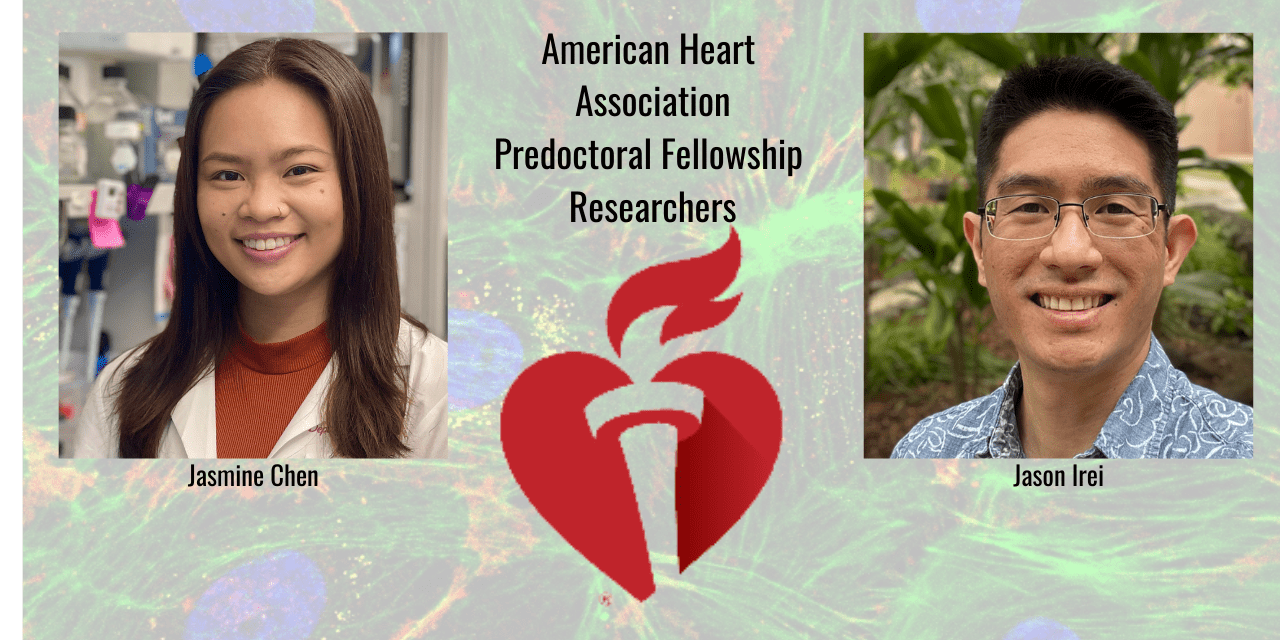
Jasmine Chen and Jason Irei, graduate students at the University of Hawaiʻi at Mānoa, have earned predoctoral fellowships from the American Heart Association (AHA) to continue their research on cardiovascular diseases. The fellowships serve to enhance research or clinical training of promising individuals in pre-doctoral or clinical health professional degree training programs and who seek careers as scientists to improve global cardiovascular health.
The Centers for Disease Control and Prevention (CDC) has recently reported that the leading cause of death in Hawaii is heart disease, more than those who have died due to cancer, Alzheimer’s disease, chronic lower respiratory disease, and diabetes.
Jasmine Chen is determined to understand how hearts heal after heart attacks, particularly focusing on one particular gene. She works in the lab of her mentor, Michelle Tallquist, PhD, chair of the Cell and Molecular Biology graduate program at JABSOM’s Center for Cardiovascular Research. Chen’s project investigates a gene involved in coronary artery disease, a major cause of death in the US. She said she is especially interested in investigating how this gene impacts inflammatory responses and scar formation after a heart attack.
“Although it has been identified as a gene that impacts coronary heart disease, little is known about how our gene functions,” Chen said. “Our studies will shed light on its role after heart injury. Ultimately this research can lead to therapeutics that can improve heart function and quality of life after heart attacks.”
Chen graduated from ʻIolani School in 2013 and earned her B.A. in Biology from Occidental College in Los Angeles in 2017. The poet Maya Angelou’s words, “Nothing will work unless you do,” is Chen’s motto when it comes to her research, and her reflection on the actions of her mentors and colleagues, all willing to work tirelessly to improve the lives of others.
“Heart disease is the leading cause of death in the United States, and every experiment or new discovery in the cardiovascular field brings us one step closer to improving the lives of so many people dealing with heart disease,” Chen said. “I’m excited and optimistic that this research will help to contribute to improving the health and well-being of others.”
According to Tallquist, being awarded an AHA Predoctoral Fellowship is a prestigious accomplishment.
“For Jasmine, this means that her research project was viewed as highly meritorious and in line with the American Heart Association’s goals of reducing heart disease by funding the best science with the greatest likelihood of having an impact,” Tallquist wrote. “It also is an accomplishment that she can use to demonstrate that she not only can ‘do’ science, but she can also justify it in a clear manner.”
Tallquist continued: “For my lab, it frees up resources that can be used to fund additional research as well as it provides recognition for the important studies that we are doing to understand the process of heart disease.”
Jason Irei is also a 2021 AHA award recipient. The 2006 ʻAiea High School grad is currently wrapping up his second year as a PhD student; and he graduated from the UH Mānoa with a degree in Biology in 2014. Irei is mentored by Dr. William Boisvert but also received vital mentorship from Dr. Jonathan Yap during Irei’s years as a research technician. Irei joined the Boisvert Lab in the Center for Cardiovascular Research at JABSOM in 2017 as a research technician and is now a graduate student in the Molecular Biosciences and Bioengineering PhD program. Irei is researching atherosclerosis, a chronic inflammatory condition characterized by the development of fatty plaques in blood vessels that increase the risk of catastrophic heart injuries and stroke.
“My research aims to illuminate the processes by which atherosclerotic plaques form by studying how stress imparted by blood flow affects cholesterol uptake into the blood vessel wall,” said Irei. “My goal is to better understand the mechanisms of how atherosclerosis begins in order to uncover targets for potential therapeutic interventions.”
Irei says he has been interested in becoming a scientist since he was young. “Research and graduate school have been one of the most stressful and difficult experiences of my life, but I wouldn’t change a thing about it,” he said “Being at the forefront of discovery and directly participating in research has been amazingly rewarding.
He is especially thankful to his mentors, Boisvert and Yap who, “without their help, I would not be in the position I am today,” said Irei.
Boisvert, who is a Professor of Medicine at JABSOM, says that Irei’s sense of responsibility and level of diligence are unmatched.
“As a young scientist in training, Jason has already demonstrated his ability to be innovative and to think outside the box combined with a healthy dose of the most important quality in all scientists, inquisitiveness,” Boisvert said. “There is no question in my mind that Jason will soon be an important contributing member of the biomedical research community.”